Pieces of plastic can go through a cat’s digestive system to the point they are eliminated through the faeces in a period of 1-2 days.
Plastic is very dangerous for cats as it is not digestible, so it can cause a wide range of problems inside your pet’s body.
Contents
What To Do If Your Cat Ate Plastic & Is Throwing Up
The chance of the piece of plastic causing havoc inside your cat’s digestive system is very high.
In fact, plastic pieces or items can cause intestinal blockages in both humans and animals.
Cats can quickly begin to vomit or experience constipation or diarrhoea, along with intense abdominal pain.
Do not try to induce vomiting as you might get bitten or you could scare your cat even more than they already are.
Take your cat to the emergency vet clinic so that a veterinarian can see exactly where the piece of plastic is located in your cat’s digestive tract and how it might be removed.
If your cat has eaten plastic and you are concerned then we recommend you speak with a vet ASAP.
JustAnswer allows you to talk in real-time to veterinary experts for a small fee.
How Do I Know If My Cat Ate Plastic?
This is an occurrence that is not likely to happen in cats that are usually completely disinterested in swallowing other things besides their own food.
However, it can be quite common in cats that have pica, a disorder that makes them eat ‘unnatural’ things including plastics or even poop.
So, if your cat is predisposed to chewing on cables, paper, or anything in this vein, and they start showing symptoms associated with digestive distress, you should assume that they have ingested something bad — whether plastic or something else.
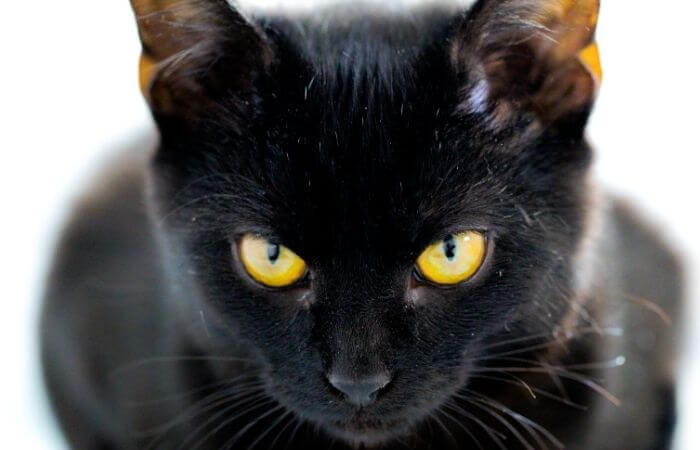
Cats that have swallowed a piece of plastic are likely to show the following clinical signs:
- Abdominal pain
- Vomiting
- Diarrhoea
- Lack of energy
- Anorexia
- Withdrawnness
- Excessive drooling
- Repeated retching
Will Cats Usually Pass A Piece Of Plastic?
This actually depends on several different factors, such as the size of the plastic piece and your cat’s otherwise well-functioning digestive system.
If your cat experiences digestive distress on a regular basis, which would happen in a pet that might have had occlusions or obstructions in the past, the chance of them passing the plastic item easily is low.
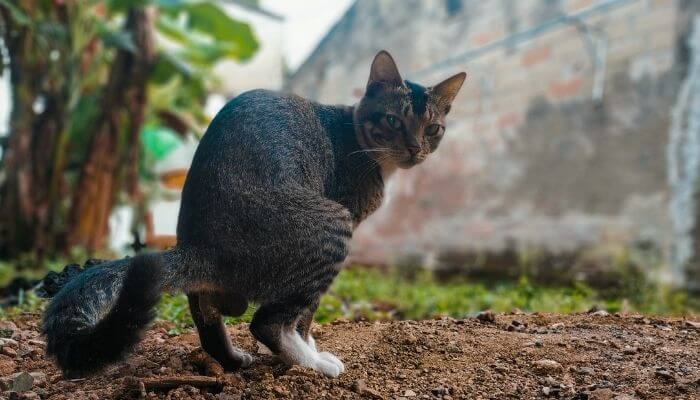
You should consider yourself and your cat very lucky if they manage to pass the plastic through their poop as if it were a piece of regular food.
More often than not, such cases need to be addressed quickly and your cat might either be performed surgery on or might have to go under general anaesthesia for interventional endoscopy to be used.
Some cats can pass the piece of plastic in a period of 2 to 3 days, though, with little to no intervention.
But since it’s always better to be safe than sorry, do make sure to bring your cat to the vet clinic so that she is kept under observation.
Can Cats Die From Eating Plastic?
Yes. As unpleasant of a topic as it might be, it is possible for cats to die after ingesting plastic.
If the plastic piece that your cat swallowed was also sharp, it could create severe lesions on the inside of their digestive tract — tears and ruptures would not be an uncommon occurrence.
The plastic could also cause a serious blockage, which could lead to local blood flow being interrupted.
Some cats are even more unlucky and can develop volvulus (a condition where their stomach rotates around its own axis), especially if they also have a diaphragmatic hernia.
What To Do If Your Cat Ate A Plastic Bag
While plastic is dangerous in general, plastic bags are even more so.
This is because the entire part of the item could wrap around your cat’s faeces or stomach contents and lead to a deadly ball being formed inside your cat’s digestive tract.
On the other hand, the plastic bag material could stick to your pet’s intestinal lining and could lead to a blockage or an occlusion that can put your cat’s life at risk.
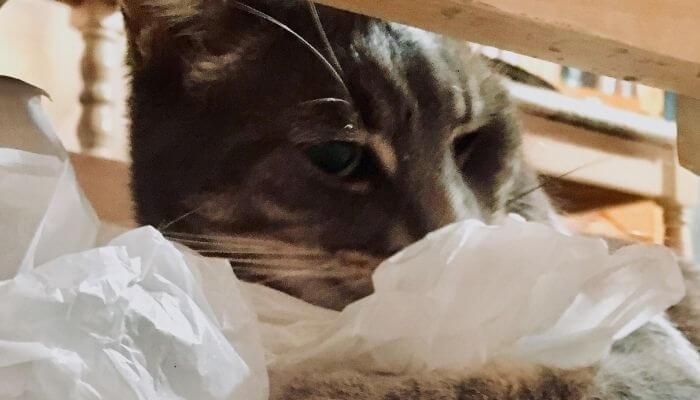
Unfortunately, plastic bags are among the most common foreign objects diagnosed in veterinary practice.
Some cats might show an increased interest in them because they might smell like cat food or you might have recently come back from the butcher’s and left the bag unattended in your home.
Other cats just love plastic bags because they might look at them as toys, so they’ll carry them across your floor and play with them as if they were tiny prey.
But as you know, cats usually nibble on their prey, so whether they eat a larger portion of the bag or not, they are likely to ingest some small pieces of plastic nonetheless — especially when you are not looking.
What To Do If Your Cat Ate A Plastic Wrapper
A plastic wrapper is just as dangerous as a plastic bag.
Therefore, if you see your cat ingesting it and you don’t manage to immediately (and more importantly, safely) pull it out from their mouth, go to the animal hospital right away.
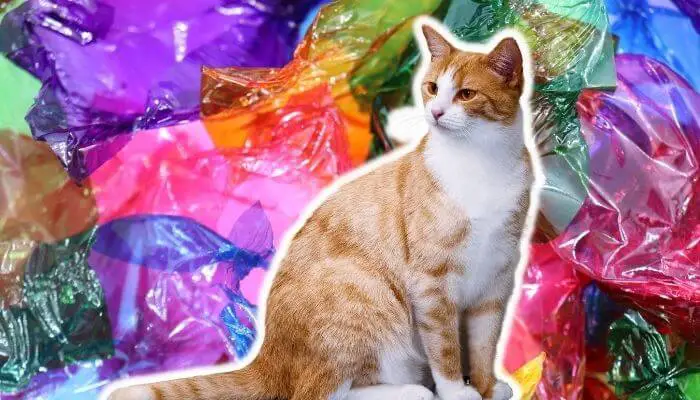
Plastic wrappers can be even more sticky compared to other items, not to mention that they might already have some sort of glue on their surface.
Glues are not safe for pets in any way, shape, or form.
So, your cat might develop an intestinal blockage or some other form of digestive problem while at the same time, suffering from an intoxication.
Some deli meats or meat cuts can be wrapped in plastic, so that’s why your pet might be interested in them.
What To Do If Your Cat Ate A Plastic Streamer
Plastic streamers can come in all sorts of shapes and sizes, but the fact that they are so varied should give you a clue as to how risky they can be when being swallowed by cats.
Since streamers are common decorations that people use either for special events such as bridal showers or weddings or for decorating their Christmas tree, that’s when cats are more likely to come in contact with them.
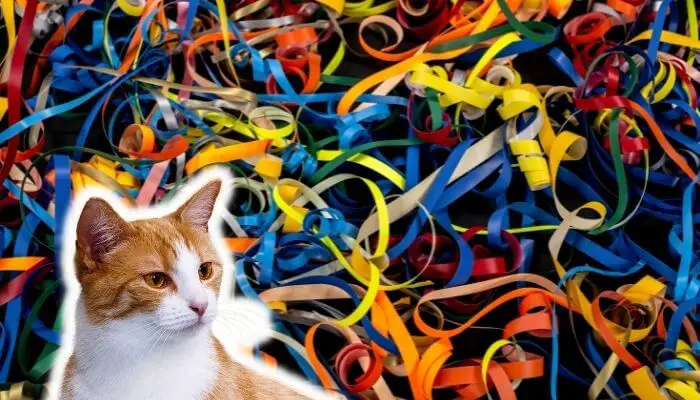
If your pet has pica and you are currently treating it, try to restrict your cat’s access to the room where the streamers are located as much as possible.
It might be challenging to keep your cat away from the Christmas tree, for example, but you should do your best.
Another tip would be to use the streamers only at the top of the tree and opt for simple ball ornaments at the bottom.
Generally, most of the special decorations you’re likely to use for various events or celebrations are not safe for cats.
That includes ribbons, string lights, streamers, and more recently dried citrus fruit slices.
In any case, if you are somehow able to tell that your cat ingested any of these or a piece of a streamer, get veterinary assistance.
And if you don’t have cat insurance and you’re having second thoughts because of that, at least give your vet a call to ask them what you should do.
How to Prevent Your Cat From Eating Plastic
One way of preventing this mishap would be to always use cat-safe toys.
As cute and funny as it might be for you to see your pet playing with a rubber band, a ribbon, or even a plastic bag, you should know that you’re just one step away from a disaster.
While most cat toys are pretty rugged because they have to put up with the abuse inflicted upon them by your pet’s teeth and claws, they can deteriorate.
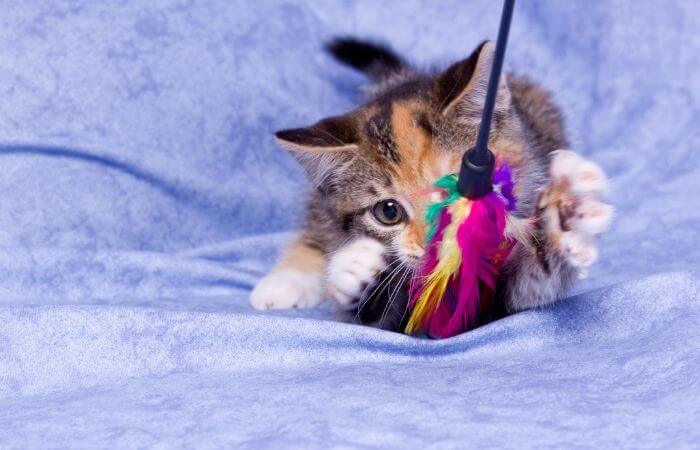
Consequently, your cat might be able to accidentally ingest a piece of the toy (that could be made from degraded plastic) while playing with it.
Carefully inspect your pet’s toys on a regular basis (at least once every two weeks or so) to make sure that this does not happen.
Finally, a cat that gets enough playtime and enough time with you is likely to be more mentally stimulated than one that gets bored all the time.
Try to devote at least 15-30 minutes per day to playing with your cat. You could set up two playtime sessions, one in the morning and one in the evening.
Kittens need more attention, so you will have to put more effort into making sure they don’t eat plastic by accident. Keep an eye on them as much as possible.
If your cat is diagnosed with pica that was developed as a result of a nutrient deficiency, make sure you give them their supplements on a regular basis.
References:

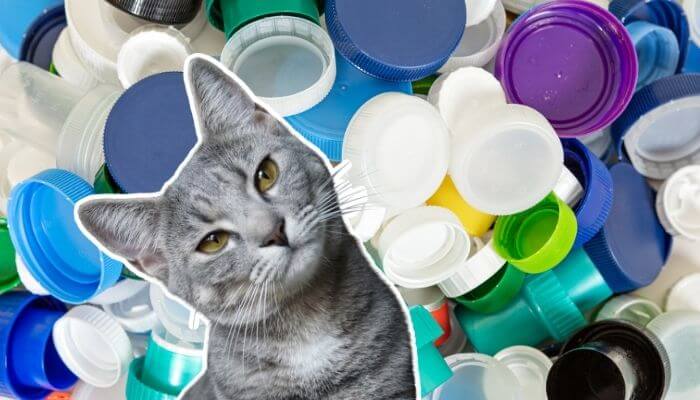
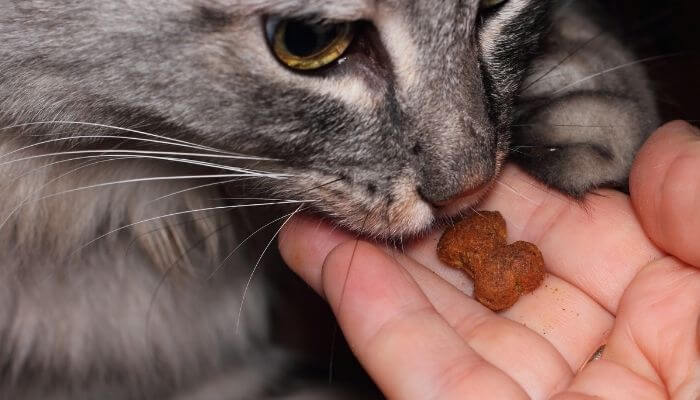
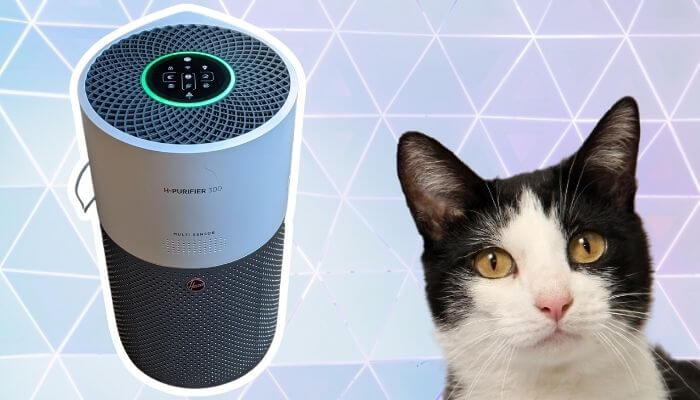
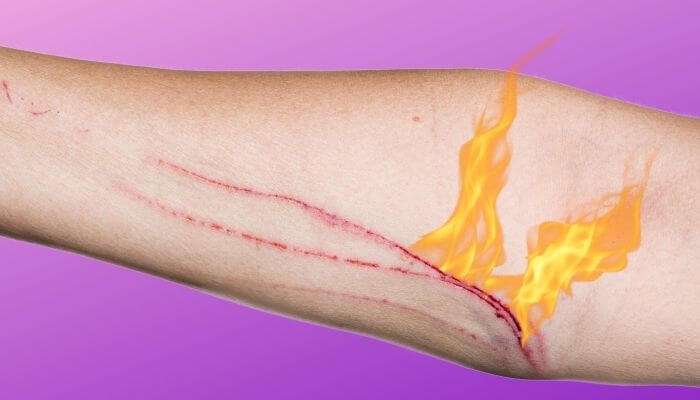
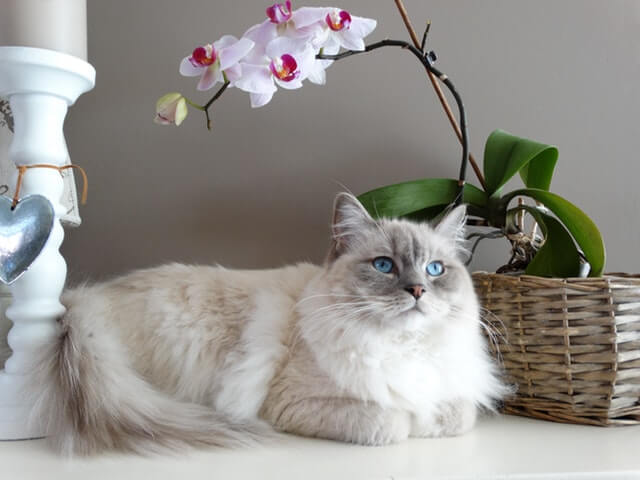
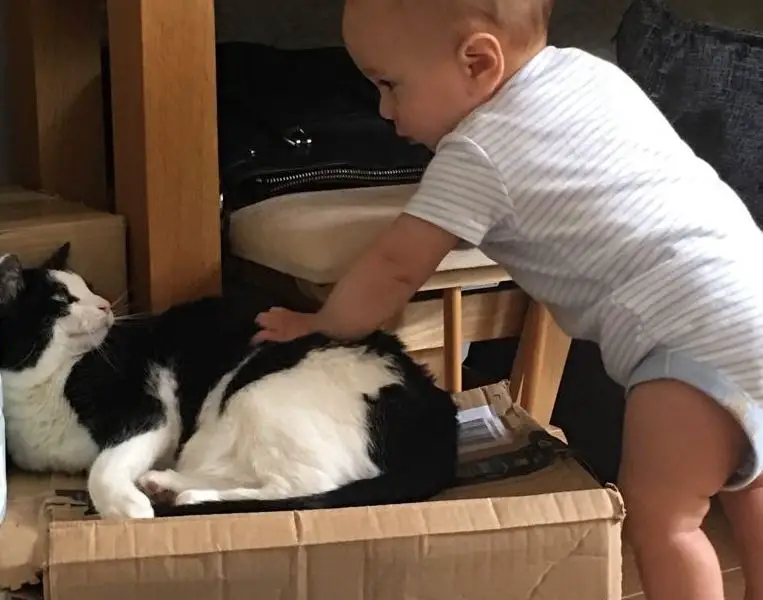
Leave a Comment